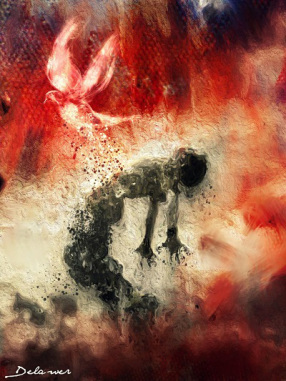
“Rebirth” by Delawer-Omar
I’ve been enjoying a Facebook conversation of Paul Hessert’s wonderful book Christ and the End of Meaning. I’ve quoted from Hessert’s book here before. It’s not an easy book to digest, but with the help of others each chapter’s review reveals bit more. Irish philosopher Peter Rollins also has an online discussion of the book, so naturally some of Rollins’ reading of Hessert is part of the conversation I’m in. If you haven’t encountered Rollins’ provocative and controversial ideas, check him out.
Rollins over-reaches, I think, in making his point against the “structure of meaning” we adopt from culture. I think he too indiscriminately dismisses the essential narrative/meaning-making structure of experience. It’s almost as if Rollins disposes of what we call the transcendentals (beauty, truth, goodness) or views them as impositions of fallen culture. I may be misunderstanding him, but I’m more confident Hessert isn’t doing this, and I want to focus on Hessert anyhow. But I fear that in trying to make my point (defending ‘meaning’ and ‘desire’), I might be understood as defending things I don’t believe in (i.e., false narratives and structures of meaning imposed on us by culture). In reading through Hessert (Ch. 2) again, I think I see his point more clearly, and I’d like to try to describe the common ground.
1) We are natural meaning-makers. On the one hand, we’re naturally driven to interpret our lives in meaningful ways – existentially, rationally, aesthetically, etc. We construct a ‘sense of self’ (an ‘identity’). This sense of self provides our answers to the questions, ‘Who am I really?’ and ‘What is my place in [the meaning of] the universe?’ question that get answered in terms of identity, relationships, belonging, significance, permanence, purpose, etc.). All textbook stuff.
2) Meaning-making as world-constructing. As finite, human beings, however, we don’t come into the world with pre-installed interpretations of life that give us the world as satisfying and meaningful. We’re born into the questions, not the answers. We have to ‘world-construct’ or compose our sense of self, and the materials out of which we build are the relationships and events of our lives, the very things whose meaning we’re seeking to establish. This search becomes a venture of despair for all of us. Why? Because nothing in or of the world (none of the ‘materials’ I use to world-construct) can tell me ‘who’ I am and what I mean. Why not? Because everything in the world is, like me, looking for its own meaning and purpose. Everything created is in that same fix, asking the same question. Indeed, to be created and finite just is to ask this question (a point on which Rollins and I may disagree if, as I suspect, he judges the question itself as misguided; that is, he sees the gospel as a way to free oneself from the questions since, in his view, there are no answers, only ways to live without them). Anyhow, we experience this failure immediately in life, but it typically takes a life-time to admit the failure of everything in the world to be a source of meaning and purpose. Hopefully our journey leads us to the Void, where only faith can lead us on.
3) Replacing ‘World’ with ‘God’. Now, what is often said (which I’m guessing some read me as offering) is something like this: “Look, stop trying to derive meaning and satisfaction from anything in the world and just get it from God instead. God is not, like the world, caught up in some existential search. As benevolent creator, God can do for you what the world has failed to do for you – viz., give your life meaning and purpose.”
What I hear Hessert saying to this is: This isn’t enough. It’s not enough simply to replace ‘World’ with ‘God’ as the source from which we derive our meaning and satisfaction and leave everything else the same. There’s something else we’ve gotten badly wrong in confusing faith with the belief that if we just put ‘God’ in the place of ‘World’ then life will become satisfying and meaningful. There’s something structurally wrong here.
What’s structurally wrong is that this mere replacement leaves in place a fundamental failure to relate to God in terms of creaturely nothingness. It leaves unaddressed the mistaken priorities in how we self-relate (and world-relate and God-relate). Amazingly, it’s possible to replace the ‘World’ as our source for happiness with ‘God’ and still be unspeakably miserable. How so? Because the Self (the “I”) is still at the center, in charge of the meaning-making with both ‘God’ and ‘World’ as options on a meaning-making menu from which the Self chooses (from some imaginary location outside the two). What’s overlooked is the fact that the Self is constitutive of the ‘World’ that needs to be displaced. Too often today, even if ‘God’ replaces ‘World’ within a person’s explicit beliefs, the structure that supports and defends the Self is still in place.
4) Idol swapping. Leaving this structure in place leaves us with a Christianity that amounts essentially just swapping out idols – ‘God’ instead of ‘this’ or ‘that’ (wherein God is another this or that, if you follow me). This leaves intact the structures of existential despair. Even as Creator, Sustainer, and Savior, if God remains that which revolves around the Self, if this structure is in place, we’re still idolaters. If this is what Hessert is getting at (and I think it is), then (a) count me in, although (b) Rollins, I think, is saying something different (and more objectionable), but that’s another discussion.

Dylan Guest sculpture
5) Restructuring and relinquishment. The fundamental restructuring (not mere replacing) that heals and redeems spells the death of the Self in all its false forms. It is an exchange that is both death and life: death of the autonomous Self, made relative to God as the Absolute in light of the Self’s nothingness. When our capacity for self-reflection (which cannot itself be an evil), for choice (which choices we cannot but make), and for meaning-making (the capacity for which cannot itself be evil and which defines choice inherently) is relinquished in the recognition of our nothingness, then structurally things are radically different. Now our meaning is “given” to us (not autonomously constructed “by us”) and relinquishment becomes possession, but a ‘possessing’ which is ‘being possessed’, a ‘desiring’ which is fulfilled in ‘being desired by’ God. In this sense we abandon our structure of meaning, but we are not unstructured or without meaning.
6) Transcendental structure. There are at least two different “structures” in Hessert’s discussion. Though he only discusses one, he hints at the other. One structure is the Self as centered and autonomous (whether bowing to an idol or to God) with God revolving around the Self in an economy of supply and demand that the Self orders and manages in terms of ‘power’ and ‘wisdom’ (1Cor 2) legitimized by culture. This structure has to be done away with. But what cannot be done away with is the transcendental structure of the human spirit – those God-given capacities (for thought, choice, self-relationality, self-transcendence, aesthetic perception and valuation).
The false self misappropriates these capacities in a despairing venture for meaning and certainty in ways culture permits, but functionally speaking these capacities remain intact for us even after our subjective powers of perception and agency become relativized by Christ. It is “I, not I, but Christ who lives in me” and not simply “I no longer live; Christ lives instead.” To judge these capacities as essentially mistaken or as an imposition of culture is to judge as mistaken the very God-given structure which makes possible “hearing” the preaching of Christ crucified and “faithing” (Hessert’s terms for “active, living, faith” that refuses cultural impositions of power and wisdom) in response. And that kind of dismissal, I suggest, is just the autonomous Self donning yet another disguise – this time the refusal to desire at all, the refusal to make-meaning at all, the refusal to feel or make aesthetic valuations at all, a kind of refusal to ‘be’ – all of which are impossible refusals to carry out. One sees how corrupt the autonomous Self is and so chooses to starve it into non-existence by denying all desire and meaning. But this leaves the Self in place just as securely as the culturally imposed structures leave it in place, because to deny desire and meaning is not to affirm the truth of one’s nothingness. That’s just a kind of suicide, and embracing the Void is not suicide.
Advertisements Share this:




